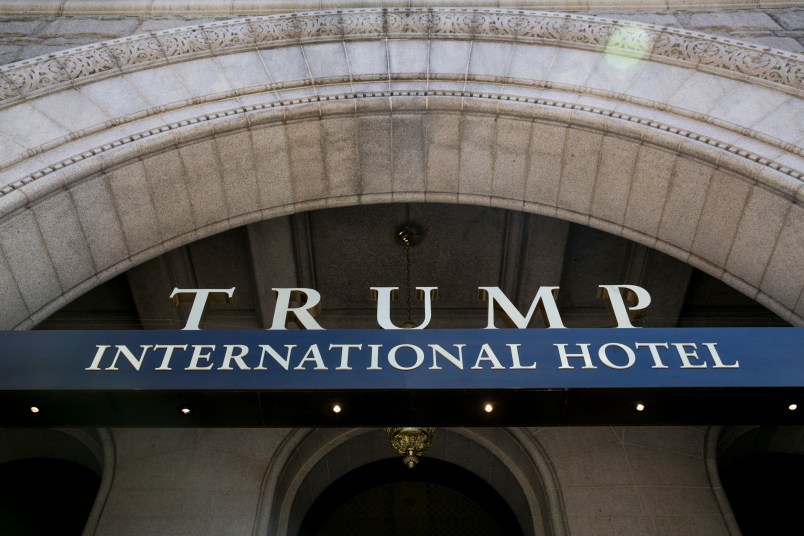A federal appeals Thursday froze a lower court case accusing Trump of violating the Constitution’s emoluments clause, halting discovery in the matter pending the resolution of the appeal.
Justice Department attorneys representing Trump had argued for an immediate halt in the matter, brought by the attorneys general for Maryland and Washington DC.
The lower court judge had denied a motion to dismiss from Trump, and allowed the state attorneys general to commence discovery earlier this month. The deadlines on 38 subpoenas were to come due on Jan. 3, but are now halted with the rest of the lower court proceedings
In the order, the Fourth Circuit Court of Appeals wrote that arguments on appeal would focus not only on a mandamus petition in which the Justice Department asked the appeals court to overrule the lower court judge, but also on whether the Constitution’s emoluments clause “provide[s] plaintiffs with a cause of action to seek injunctive relief” and whether the state attorneys general have alleged sufficient harm to grant them standing to sue the president.
The appeals court set oral arguments in the case for March 19-21, 2019.







This is disappointing. He’s committing crimes in plain sight, fer chis’sake. Smells like the fix is in.
I suppose it’s fair to halt proceedings given the appeal, but why the hell does it take so long to schedule oral arguments in these cases? March? How about next week?
Oral argument only happens after extensive briefing is filed by both sides – typically an opening brief by the party bringing the appeal, then a brief by the party opposing, and a final rebuttal brief by the appellant. A schedule is set for that. (Sometimes additional briefing is allowed.) Plus, in high-profile cases, friend-of-the-court (“amicus”) briefs from state attorneys general, advocacy organizations, etc. are typically allowed – the court approves which entities will have the right to file such briefs, and sets a deadline for them. Based on the parties’ briefs plus amicus briefs plus their own research, clerks for the appellate court judges prepare memos and the judges use those plus the briefs to prepare for oral argument. (That cutting question – or series of astute questions – leading to a key realization or concession at oral argument aren’t typically made up on the spot.) All of that takes time, even for a more run-of-the-mill case; March for oral argument in a case of this level of importance and complexity is not a very long time at all. (Yes, I am a lawyer – and have seen and argued cases on appeal.)
As my dear old Dad used to say, “Horsefeathers!”
If the attorneys general of two of our states don’t have standing to enforce an anti-corruption clause in our federal Constitution, then WHO THE F*** DOES?
Do they expect Trump’s appointee U.S. attorney general to enforce this? He serves at the pleasure of the President, for Crikey’s sake.
Or is it just window-dressing? Like “one man, one vote” has become with “corporations are people” and “Citizens United” and all the incessant gerrymandering?
It feels absurd in this case. A waste of time, money, and justice.